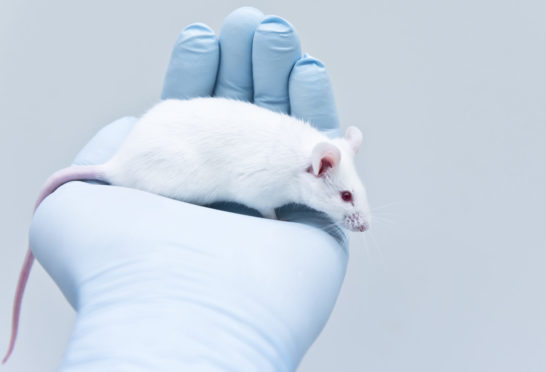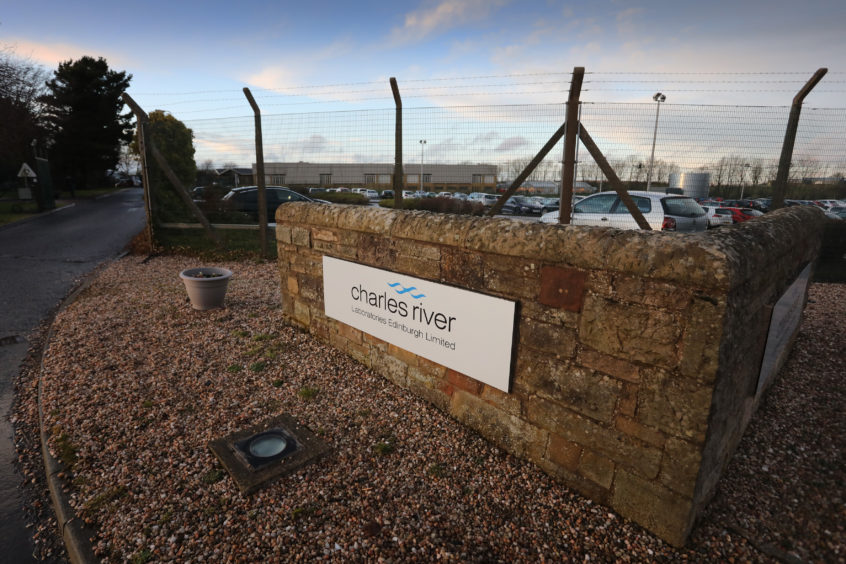
One of the world’s biggest animal research labs has been sanctioned after being accused of leaving hundreds of rats in an industrial crusher by mistake, we can reveal.
Scores of rodents died after being crushed to death in a rubbish compressor, according to a whistleblower, while others began self-harming after being given the wrong doses of chemicals during trials.
The Home Office yesterday confirmed an inquiry prompted by the claims has led to sanctions against Charles River Laboratories, operator of the Elphinstone Research Centre in East Lothian.
The multinational is one of the world’s largest suppliers of laboratory research services to pharmaceutical and biotech companies. It experiments on dogs, monkeys, rats and mice to make medicines, fertilisers and weedkillers.
The UK Government began investigating the labs in Tranent after the whistleblower contacted animal welfare group Peta, claiming that up to 54 live rats, including pregnant females, died in the crusher after a box containing hundreds of rodents was taken for destruction in error.
Animal welfare groups yesterday condemned the incident and called on the Home Office to review Charles River Laboratories’ licence. The firm, which breeds its own animals for research, employs nearly 1,000 people in Tranent.
The Sunday Post has seen a copy of a letter, and an affidavit from the whistleblower, which was submitted by Peta to the Home Office. The letter requested an inquiry and cited a series of incidents last year including one on July 23 when dozens of live rats were killed.
The charity told the Home Office: “Approximately 100 to 120 rats were delivered in standard transport boxes to Block N of the toxicology unit from the breeding centre in Margate. The boxes containing the rats were placed inside the airlock but, for reasons unknown, the rats were not then transferred into their home cages.
“Instead, the boxes containing the rats were later placed into the area where rubbish is collected by site services and were then moved via forklift to the rubbish compressor. They were placed into the compressor, which was then turned on.
“It was later brought to the attention of staff that boxes containing live animals had been placed inside the compressor and had been crushed.
“The boxes were subsequently removed, and it was discovered that approximately 50 to 54 rats, including pregnant females, had been crushed to death. The rats who had been crushed but had not died were euthanised.”
One staff member was dismissed following the incident, the whistleblower claimed, while another was suspended and later issued with a warning.
In another incident, it was alleged, rats being experimented on during an inhalation study were exposed to chloromethane, a chemical gas.
The whistleblower said: “During the study, self-mutilation behaviour was witnessed among the rats, but this did not necessarily result in euthanasia.
“However, five rats who were in the high-dose group were mistakenly forced to inhale a dose that was above the maximum limit. Consequently, they suffered to the extent that they chewed their own limbs; one female chewed a toe off one of her front feet. All five were subsequently euthanised.
“The study was not cancelled at the time of this incident, but the rats who had been exposed to too much chloromethane were removed from the dataset.”
In a third incident, rats were allegedly given the wrong test compound during a cancer study. “The rats in group three were given the compound meant for the rats in group four. It was reported to us that the technician responsible for dosing the rats had not read the label properly,” Peta said.
“Despite the mistake, the study continued, and standard operating procedures were changed so two people now have to check the barcode and concentration on the container match the printed dose request kept in the study folder.
“However, it is possible for a barcode scanner to be used so that animals can’t be dosed until the substance label has been registered via the scanner and computer, yet this safeguarding procedure has not, to the whistleblower’s knowledge, been put in place.”
The whistleblower also raised concerns about the level of animal care at weekends due to a skeleton staff system being employed by the firm. Peta complained: “They are allowed to go home once their tasks are complete; however, it was pointed out to us that some staff members have a tendency to rush their jobs so they could go home sooner. This, therefore, raises concerns about the level of care taken in carrying out these duties,” the letter said.
Dr Julia Baines, a senior science policy adviser at Peta UK, said: “Experimenting on animals is a dirty business, and Charles River Laboratories is one of the world’s top peddlers of misery and death, reportedly supplying one in every two animals used in experiments and therefore having a hand in half of all the pain, fear and distress endured by animals in laboratories around the globe.
“The company has previously been found to have violated animal welfare regulations in the US and now in Scotland. Animals are not inanimate pieces of laboratory equipment to be recklessly drugged, gassed, discarded or cut up in cruel experiments.
“PETA is calling for the Home Office to revoke Charles River Laboratories’ licence.”
The Home Office said: “We were made aware of the allegations on December 4, 2019, and our whistleblowing policy was followed accordingly. Inspectors have conducted their investigations. Where appropriate, sanctions have been applied.”
Charles River Laboratories said: “The survival rates for major diseases are at an all-time high due in part to the discovery of new medicines and therapies. The use of animal research models remains a vital component of these discoveries and is required by international regulatory agencies.
“We are deeply committed to animal welfare and exceeding international standards for the care of research models under our stewardship. We are committed to the 3Rs (replacement, reduction and refinement) and, when possible, our goal is to reduce the number of animals used.
“Additionally, we partner with customers to develop study designs that adopt the philosophy of the 3Rs, including the use of in vitro studies accepted by international authorities. As animal caregivers and scientific researchers, we are responsible to our clients and the public for the health and well-being of the animals in our care, and we strive to fulfil that responsibility on a daily basis.”
Eve Massie, of animal welfare charity OneKind, said: “Recent Home Office figures reveal 3.52 million procedures were carried out on animals in Britain in 2018. The Home Office regularly documents non-compliance in animal experiments and we’d welcome a statement on the course of action they plan to take to reduce these instances.
“Ultimately, OneKind seeks an end to the use of all animals in experiments through the process of the replacement, as the most effective of the principles known as the 3Rs. There should be increased investment in alternatives to animal testing, such as isolated cells and tissues, computer and mathematical models to predict the effects of chemicals and drugs and designing experiments for human volunteers.
“The breaches reported are serious in nature and we hope will lead to appropriate sanctions by the authorities and a thorough review of practices in the laboratory concerned.”
The company: 32 monkeys overheated in US labs
Charles River Laboratories is a US corporation founded in 1947. Its headquarters are located in Wilmington, Massachusetts, US, and it has 80 facilities in 20 countries and 14,700 employees worldwide.
Its laboratory in Tranent, East Lothian, employs nearly 1,000 staff and traces its origins back to post-war seaweed research at Inveresk village. Since then the firm has branched out into pharmacology and toxicology.
The company was previously called Inveresk Research, which merged with Charles River Laboratories in 2005. In 2006, it emerged the Home Office had cleared the research centre after allegations it had breached its animal testing licence.
The Home Office conducted an investigation after photos were leaked by Animal Defenders International of dogs with masks over their faces and a monkey in clamps at its lab in Tranent.
Last month, it was announced that data analysis firm called Fios Genomics had entered into a partnership with Charles River Laboratories. Fios Genomics is an Edinburgh University spin-out.
Fios Genomics helps pharmaceutical and biotech companies analyse the large amounts of data generated during drug development.
An undercover investigation last year by The Humane Society of the United States revealed more than 60,000 dogs had been experimented on by Charles River.
In 2008, 32 monkeys died of overheating at the company’s laboratory in Sparks, Nevada, after a climate system failure. Peta filed a complaint with the US over the incident.
The following year, a monkey died at the same facility after being left in their cage as it was going through a hot cage washer. Charles River was fined $14,500 for the two incidents.
Drop in number of animals used in experiments
The number of animals used for scientific research is declining across Europe, according to a new study.
The European Commission has released its first report into the state of animal experimentation since the introduction of more stringent regulations seven years ago.
The study analyses the impact of the legislation, designed to reduce the use of animals in research and minimize their suffering.
Latest figures reveal 9.39 million animals were used for scientific purposes in 2017 – the most recent year for which data has been collected – compared with 9.59 million in 2015.
More than two-thirds of these animals were used in basic or applied research, while a quarter were involved in the testing of drugs and other chemicals. Other uses included the production of biological agents such as vaccines, as well as for teaching purposes and forensic investigations.
More than 60% of the animals used in 2017 were mice, 12% were rats, 13% were fish and 6% were birds. Dogs, cats and non-human primates made up 0.3% of the total.
The legislation promotes testing methods that cause the least pain.
As well as gathering data on the number and species of animals used in research, member states must now collect information on the number of times each animal is used, the purpose, and the severity of experimental procedures animals experience.
The European Commission said detailed data “allow us to identify far more effectively where best to target resources to help reduce the number and suffering of animals”.
Research animals up for adoption
Authorities in the US are allowing animals used for research to be adopted by new owners.
The Food and Drug Administration says healthy dogs, cats, rabbits, guinea pigs and some farm animals can now be transferred to shelters after being used in experiments.
Previously, the animals were euthanised. New guidelines say the policy applies to animals that have “completed a research study and have no apparent health or behaviour concerns”.

Enjoy the convenience of having The Sunday Post delivered as a digital ePaper straight to your smartphone, tablet or computer.
Subscribe for only £5.49 a month and enjoy all the benefits of the printed paper as a digital replica.
Subscribe
